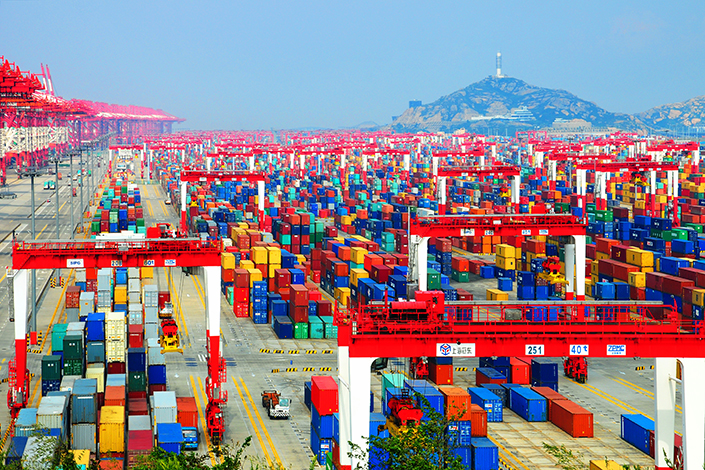Shanghai Port Chokes on Booming Trade

The Port of Shanghai, the world’s busiest for container shipping, has been combating severe congestion for more than a month due to excessive traffic, causing the problem to spread to neighboring ports in Ningbo and Qingdao.
On April 13, port operator Shanghai International Port Group (SIPG) posted two statements saying higher-than-usual volumes had led to long delays for arriving ships. Near April 10, a number of shipping companies announced changes to their schedules due to the congestion.
The port blames the congestion on a recent shake-up in major shipping alliances, according to an SIPG spokesman, replying to an inquiry from Caixin. On April 1, ocean carrier alliances saw a reshuffle, which formed three new alliances to replace the previous four.
But industry experts blamed the congestion on the port’s long-term lack of capacity. According to Xu Jianhua, a professor at Shanghai Maritime University, the designed handling capacity for the port is only 20 million twenty-foot equivalent units (TEUs), but last year it handled 37 million.
“To relieve the congestion, the port of Shanghai should divert container ships to neighboring ports, but it always want to keep the suppliers to itself,” said Xu.
Under current conditions, ships have been left stranded at outer anchorages for up to 18 days until berths become available. The long delays increase shipping costs, and in the end consumers may pay for the problem, said Xu.
Another port expert told Caixin many customers in provinces near Shanghai prefer to ship their goods via the port rather than other nearby destinations because of its better environment.
Other factors contributing to the congestion include China’s rapid trade growth this year, and a recent update to the information system in the Port of Shanghai, according to experts.
The SIPG spokesman said the congestion could ease when ocean carriers finish readjusting shipping schedules. Experts believe the situation will last longer if China’s trade continues to grow, until at least the end of May, and possibly as late as the slack season of July, August, and September.
Contact reporter Song Shiqing (shiqingsong@caixin.com)

- 1Cover Story: China Carves Out a Narrow Path for Offshore Asset Tokenization
- 2Drownings Shake Chinese Enthusiasm for Travel to Russia
- 3Over Half of China’s Provinces Cut Revenue Targets
- 4Li Ka-Shing’s Port Empire Hit by Forced Takeover Amid Panama Legal Dispute
- 5In Depth: China’s Mutual Fund Industry Faces Overhaul After a Banner 2025
- 1Power To The People: Pintec Serves A Booming Consumer Class
- 2Largest hotel group in Europe accepts UnionPay
- 3UnionPay mobile QuickPass debuts in Hong Kong
- 4UnionPay International launches premium catering privilege U Dining Collection
- 5UnionPay International’s U Plan has covered over 1600 stores overseas



